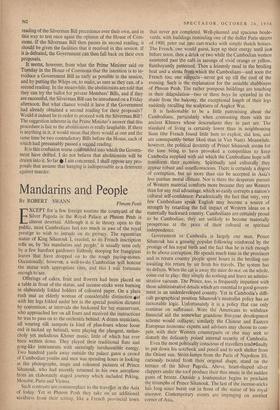Mandarins and People
EXCEPT for a few foreign tourists the courtyard of the Silver Pagoda in the Royal Palace. at Phnom Penh is almost deserted. Although it, is in theory open to the public, most Cambodians feel too much in awe of the royal prestige to wish to intrude on its privacy. The equestrian statue of King Sihanouk 1, erected, so its French inscription tells us, by 'his mandarins and people.' is usually seen Only ' by .a-few barefoot gardeners listlessly stooping for frangipani leaves that have dropped on to the rough paying-stones. Occasionally, however, a well-to-do Cambodian will honour the statue with appropriate rites, and this 1 was fortunate enough to see.
Offerings of cakes, fruit and flowers had been placed on a table in front of. the statue, and incense-sticks were burning in elaborately folded holders of coloured paper. On a plain rush mat an elderly woman of considerable distinction `at with her legs folded under her in the special position dictated by convention; at intervals she beckoned for her manservant, who approached her on all fours and received the instructions he was to pass on to the orchestra behind: A dozen musicians, all wearing silk sampots (a kind of plus-fours whose loose end is tucked up behind), were playing the plangent, melan- choly yet melodious Khmer music, little of which has ever been written down. They played their traditional flute and gong-like instruments with seemingly inexhaustible energy. Two hundred yards away outside the palace gates a crowd of Cambodian youths and men was spending hours in looking at the photographs, maps and coloured pictures of .Prince Sihanouk, who had recently returned in his own aeroplane from an elaborately staged journey which included Peking, Moscow, Paris and Vienna.
Such contrasts are: common pia& to the traveller in the Asia of today. Yet in Phnom Penh they take on an additional vividness from their setting, like a French provincial town that never got completed. Well-planned and spacious boule- vards, with buildings reminding one of the duller Paris streets of 1900, peter out into cart-tracks with simple thatch houses.
The French, one would guess, kept up their energy until just before noon, then a drink or two while the Cambodian women sauntered past the cafe in sarongs of vivid orange or yellow, flamboyantly patterned. Then a leisurely meal in the broiling heat and a siesta from which the Cambodians—and soon the French too, one suspects—never got up till the cool of the evening. Such is the explanation for the amiable shabbiness of Phnom Penh. The rather pompous buildings are touching in their dilapidation—two or three boys lie sprawled in the shade from the balcony, the exceptional length of their legs suddenly recalling the sculptures of Angkor Wat.
It is fashionable to be a little patronising about the Cambodians. particularly when contrasting them with the ancient Khmers whose descendants they in part area The standard of living is certainly lower than in neighbouring Siam (the French found little here to exploit, did less, and are consequently better liked-than in Viet Nam). Meanwhile. however, the political dexterity of Prince Sihanouk seems for the time being to have provoked a competition to keep Cambodia supplied with aid which the Cambodians hope will transform their . economy. Spiritually and culturally they appear robust and unselfconscious. There is certainly a degree of corruption, but no more than can be accepted in Asia's less puritan moral climate. Nor is there the desperate pursuit of Western material comforts more because they are Western than for any real advantage, which so easily corrupts a nation's cultural self-confidence: Paradoxically the fact that very, very few Cambodians speak English may become a source of strength by retarding the full impact of Western ideas on a materially backward country. Cambodians are certainly proud to be Cambodian; they are unlikely to become materially prosperous at the price of their cultural or spiritual independence.
Government in Cambodia , is largely one man. Prince Sihanouk has a germ* popular following reinforced by the prestige of his royal birth and the fact that he is rich enough to be above corruption. He spends much time in the provinces and- in return country people spent hours in the broiling sun awaiting his return by air from his travels. The system has its defects. When the cat is away the mice do not, on the.whole. come out to play; they simply do nothing and leave an admini- strative vacuum. The Prince, too, is frequently impatient with those administrative details which are essential to good-govern- ment in an undercievel;oped country. Yet in Cambodia's diffi- cult geographical position Sihanouk's neutralist policy has an inexorable logic. Unfortunately it is., a policy that can only continue on sufferance. Were the Americans to withdraw financial aid the somewhat grandiose five-year development scheme would collapse; similarly the Chinese and Eastern European economic experts and advisers may choose to com- pete with their Western, counterparts or else may seek to disturb the delicately poised internal security of Cambodia.
Even the most politically conscious of travellers tendgfinally to put down his notebook and pencil and to seek shelter from the Orient sun. Street-lamps from the Paris of Napoleon Ill. curiously twisted from their original shape, stand on the terrace of, the Silver Pagoda. Above, heart-shaped silver clappers under the roof produce their thin music in the sudden gusts of breeze.. Outside a loudspeaker begins to proclaim the triumphs of Prince Sihanouk. The last of the incense-sticks ha's long since burnt out in front of the statue of his royal ancestor. Contemporary event's are impinging on another corner of Asia.










































 Previous page
Previous page